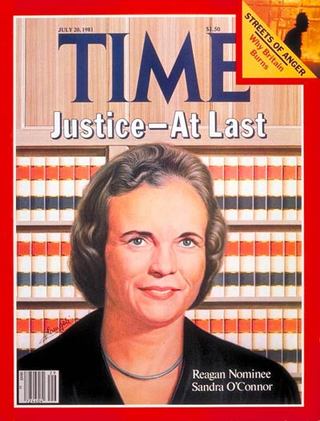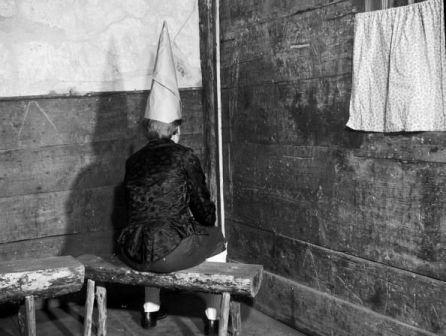Former Supreme Court Justice Sandra Day O’Connor died on Friday. This essay regarding her influence on American educational standards originally ran on May 12, 2011, but today it may be more timely than ever. Specific temporal references (e.g., “seven or eight years ago,” “last week,” “the current”) remain the same as in the original post.
One morning seven or eight years ago, I was part of a group that had an audience with a Supreme Court justice. The sponsor of the visit was a literary organization; a board member apparently knew someone who could arrange access. And so on a weekday morning a few minutes before 11, a couple of dozen of us found ourselves taking our seats in a chamber in the Supreme Court Building, wondering which justice would appear. We had just walked down one of those impossibly white, and marbled, and echoing hallways so common in the nation’s capital, the kind of setting that makes you want to believe in the impartiality of the execution of justice. Then a door to an adjoining chamber opened, and in walked Sandra Day O’Connor.
She talked for ten or fifteen minutes. I remember she said she liked Seabiscuit, the movie. She also said she liked The Da Vinci Code, the book. But pretty much everything else she said flew out of my head the moment she mentioned the words “swing vote.”
She had heard herself described as one, she said, but she professed having no idea as to what the term might mean. The Court consisted of nine justices. She was but one. How could her vote carry more meaning than any another justice’s?
She seemed genuinely perplexed. Maybe she was. More’s the pity. In any case, she then said she would take questions.
I was tempted, I admit. But then I considered the sponsoring organization; I didn’t want to ensure that its members would never be granted another Supreme Court audience. So I managed to restrain myself from asking Justice O’Connor the question that had been jackhammering my brain for the past quarter of an hour: “How do you sleep?”
I thought about this non-encounter last week when I read O’Connor’s response to the results of the latest National Assessment of Educational Progress (NAEP), more commonly known, and even trademarked, as “The Nation’s Report Card.” Congress, via the Department of Education, authorizes NAEP to conduct periodic surveys of primary and secondary school students. In the case of the 2010 survey, 7,100 fourth graders, 9,600 eighth graders, and 9,900 twelfth graders had demonstrated a cumulative 24 percent score of Proficient or higher in civics.
“Today’s NAEP results confirm that we have a crisis on our hands when it comes to civics education,” O’Connor said. She spoke, in part, on behalf of icivics.org, a non-profit website she founded last year specifically to enhance the nation’s knowledge of civics.
We can argue—and legal scholars no doubt will argue, for generations to come—whether the U.S. Supreme Court was the proper venue for deciding the 2000 presidential election. We can also argue whether the decision in Bush v. Gore should have divided along party lines. But once it was clear to the nine justices that the decision would in fact be dividing along party lines, O’Connor became the de facto swing vote.
Reliably to the left were Justices Breyer, Ginsburg, Souter, Stevens. To the right were Justices Kennedy, Rehnquist, Scalia, and Thomas. O’Connor is correct in asserting that any one of those justices might have voted in a way that he or she, in the end, did not. Under the laws of quantum mechanics, anything is possible. Still, the probability of Clarence Thomas joining a decision that would place Albert Gore, Jr., in the White House seems statistically even more remote than a butterfly giving birth to a dragon.
Whether O’Connor likes her role in history or not, it was she who placed George W. Bush in the White House. Who knows what she was thinking? Even she doesn’t, apparently. In any case, it’s safe to say she wasn’t thinking about education, because if she were—well, which of those two candidates do you think would be more likely to believe in the power of facts to advance, in the words of the NAEP report, “the civics knowledge and skills that are critical to the responsibilities of citizenship in America’s constitutional democracy”?
The cover story in the current ABA (as in American Bar Association) Journal traces O’Connor’s “crisis” in civics education to tests in the late 1990s showing American students performing “poorly in reading, science and math against students from 20 other Western nations.” In response, government policy would shift toward emphasizing those subjects—but only “at the expense of history, social studies, government and civics.
“That trend began in 2001 with the Bush administration’s landmark No Child Left Behind Act, which gives priority to federal funding for efforts to improve student performance in reading and math, skills that are considered fundamental to student success in the workplace,” the article continues. “Educators fear that this long-range focus on a few limited subjects that are considered fundamental to student success is squeezing out the amount of time and effort devoted to subjects considered nonfundamental, such as history, social science, government and civics.”
The repercussions of O’Connor’s politics have hit her where she lives, metaphorically speaking. Literally speaking, the same was true of Nancy Reagan, who committed right wing heresy by advocating the use of stem cells for research on Alzheimer’s disease…but only once her husband was dying from it. And the same was true of the grandmother in the short story “A Good Man Is Hard to Find,” by a different O’Connor—Flannery, the American author. At the end of the story, the grandmother—a character who is the absence of empathy incarnate—experiences an epiphany…but only once the criminal known as The Misfit and his two henchman have killed every member of her family and she finds herself sprawled in a ditch, facing the barrel of a gun. The Misfit kills her anyway:
“ ‘She would of been a good woman,’ The Misfit said, ‘if it had been somebody there to shoot her every minute of her life.’ ”
I care deeply about the state of science education in this country. But I take no solace from the fact that science has ostensibly been an educational priority for the past decade, both because I know that its primacy comes at the expense of equally worthy subjects, such as civics, and because I long ago learned a civics lesson of my own: It’s what we do in the minutes that somebody isn’t there to shoot us that counts.
* * *


Oh my goodness sake, Richard, nobody in the history of anything has ever linked Sandra Day with Flannery. Smart, interesting post.
Richard, This is one of the best, most articulate, and thoughtful blog-posts I’ve read in a long time.
Richard Panek’s blog “A Swing and a Miss” reminds me:
While watching the results roll in during the last presidential election, with that map of red and blue districts, a comment by one of the talking heads jumped out at me: “The highly-educated urban areas of the northeast normally vote liberal…”
Sounds like an argument, if one were conservative, to de-fund education.
If I were given to conspiracy theories, I’d suspect that the conservative powers-that-be had already figured this out, years ago, and discovered that it was civics education in particular that liberalized kids. So, don’t just reduce education funding, emphasize science at the expense of civics. Dumb down the voting public while simultaneously appearing to support better education! Two mints in one!
But, seriously, whether or not one believes Republicans capable of such long-range thinking, the continual erosion of our education system must be contributing to the loss of civil discourse in our country. The void left by lack of education is usually filled by fear. That ignorance and fear is what makes the heartland vote against its own interests, and brings about increasingly-larger swings of political sentiment. The Bush administration got us in a mess, let’s vote for Obama. Two years later, his administration has not fixed everything, so let’s vote for Republicans again.
Myself, I’m dismayed by our shocking polarization and political gridlock. Like Churchill, the thing I fear is fear itself.
Mark and Ann–thanks very much. Mark, your approach to the cultural divide is one I haven’t heard before–linking the decline in civics education to the cultural divide (and conquer). Thanks for posting.
Richard, I felt myself exactly in your shoes as you bit your tongue. I have, for years, put the blame for the Bush years almost solely on Justice O’Connor for the exact same reasons, and would have struggled not to say or ask something similar.
Perhaps that oversimplifies something so complex and enormous that, inevitably, the corporate interests and their unlimited resources could always manipulate public attitudes to their best interests and chosen candidates.
Exactly after 2001 our local junior high dropped some incredibly comprehensive civics projects, in which students were assigned causes or issues to support (needing to research the pros and cons) and then either support candidates or become one themselves; as the “election” approached, polls would indicate which candidates were in the lead, and those leaders would approach the lower-numbered candidates to ask for their support, and they would hammer out agreements for exchanges of support for the initial causes and issues; eventually the small handful of remaining, coalitioned candidates would appoint campaign managers, signs and buttons would be all over the schools, speeches made, and an election held. I was so impressed with the level of involvement of every student, and could not believe it when the program was discontinued after 2001.
The conservatives created think tanks years ago (or perhaps, their corporate handlers did) to create lists of buzzwords to be used repeatedly in either a positive way (“family values”) or negative tone (“liberal.”) Said repeatedly by all in their party, these terms eventually meant to the public what the think tank wanted it to mean.
Bush Sr. used the tactic well, and immediately after the 1999 polls closed and the count appeared too close to call, the Bush camp started saying Gore was “trying to steal” the election. He was put on the defensive – intentionally – and it looked to a lot of the public like he was guilty of that charge.
Although Justice O’Connor made it official, our society made it possible.
How sad that we can be so culturally malleable.
Liz–thanks for such a thoughtful reply. That example of the civics class is heart-rending.